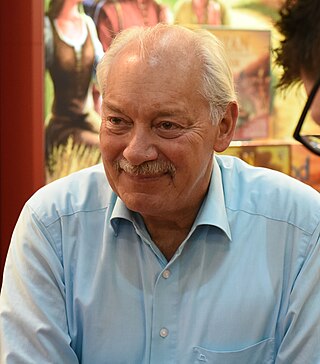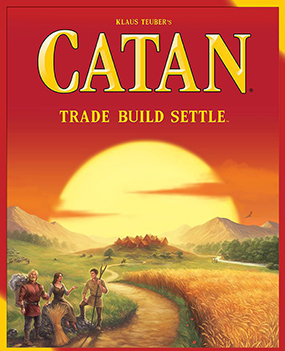
Klaus Teuber was a German board game designer best known as the creator of Catan. Originally working as a dental technician, he began designing games first as a hobby then as a full-time career.

Now You See It is an American television game show created by Frank Wayne for Mark Goodson-Bill Todman Productions. The object of Now You See It is to answer general knowledge trivia questions by finding the answers hidden in a grid, similar to a word search puzzle.

Top Secret Spies is a spy-themed German-style board game designed by Wolfgang Kramer and published in 1984 by Ravensburger. The game, also known as Under Cover or Detective & Co, won the Spiel des Jahres award in 1986.

Stump the Schwab is an American game show that aired on ESPN2 and ESPN Classic from July 8, 2004 to September 29, 2006. The show featured three contestants trying to defeat Howie Schwab, ESPN's first statistician, in a sports trivia contest. Stuart Scott was the show's host. The show also appeared on Canada's The Score Television Network.
Blokken (Blocks) is a Belgian quiz show based on the video game Tetris. It is broadcast by één and hosted by Belgian television personality Ben Crabbé. The show is the longest running quiz show on Belgian television, with 22 seasons. On 10 December 2017 the show aired its 5000th episode.

Wheel of Fortune is a British television game show based on the American show of the same name created by Merv Griffin. Contestants compete to solve word puzzles, similar to those used in Hangman, to win cash and prizes. The title refers to the show's giant carnival wheel that contestants spin throughout the course of the game to determine their cash and/or prizes.
Catan Histories: Struggle for Rome is a 2006 German-style board game based on the game mechanics of Settlers of Catan, depicting the fall of the Western Roman Empire. The game is created by Klaus Teuber, the creator of Settlers, and is published under license from Catan GmbH by Kosmos in German and Mayfair Games in English. It is the second game in the Catan Histories series of board games. Often games produced in different languages by different publishers have slight rule differences between the versions. Catan Histories: Struggle for Rome is no exception.

TV Slagalica or simply Slagalica is a Serbian quiz show produced by RTS and airs on RTS1. It is based on Des chiffres et des lettres, a French game show. It first aired on 22 November 1993. at 7 pm. It consists of seven simple mind games. Contestants play for a spot in the quarter-finals, semi finals and then the finals. Contestants win prizes as they progress. It has four female hosts: Marija Veljković, Kristina Radenković, Milica Gacin and Jelena Simić. After the end of each 10th series, winners of each of the previous 10 series', with the addition of 6 runners-up, play in the superfinal using the same system as a regular series. In the superfinal, there is also an additional game played.
A number of related games under the Yahtzee brand have been produced. They all commonly use dice as the primary tool for game play, but all differ generally. As Yahtzee itself has been sold since 1954, the variants released over the years are more recent in comparison, with the oldest one, Triple Yahtzee, developed in 1972, eighteen years after the introduction of the parent game.

Beagle Bag is a collection of video games for the Apple II family of computers published in 1982 by Beagle Bros Software. In common with their other titles, the Beagle Bag software was released in unlocked and unprotected form, and is now in the public domain.
Oceania is a board game by Klaus Teuber, published by Mayfair Games. It is a simpler version of Entdecker, and is played with one or two players. The solitaire version's objective is completely different from the two player version's.
Realm of the Jade Goddess is a German-style board game designed by Klaus Teuber and published in 2007 by Kosmos in Germany. It was originally available in limited release, and there has been no plans to release an edition for other languages.
Family Game Night is an American television game show based on Hasbro's family of board games and EA's video game franchise of the same name. The show was hosted by Todd Newton. Burton Richardson was the announcer for the first two seasons; he was replaced by Stacey J. Aswad in the third season, and Andrew Kishino was hired for the fourth season. The 60-minute program debuted on October 10, 2010, on The Hub ; it was previewed on October 9, 2010, on its sister channel, TLC. Seasons 1 and 2 contained 26 and 30 episodes respectively. Seasons 3, 4 and 5 each contained 15 episodes. Season 2 premiered on Friday, September 2, 2011, with additional games being added. The games added to the second season included Cranium Brain Breaks, Green Scream, Ratuki Go-Round, Simon Flash, Operation Sam Dunk, Trouble Pop Quiz, and Spelling Bee. However games from the previous season were still kept.

Catan, previously known as The Settlers of Catan or simply Settlers, is a multiplayer board game designed by Klaus Teuber. It was first published in 1995 in Germany by Franckh-Kosmos Verlag (Kosmos) as Die Siedler von Catan. Players take on the roles of settlers, each attempting to build and develop holdings while trading and acquiring resources. Players gain victory points as their settlements grow and the first to reach a set number of victory points, typically 10, wins. The game and its many expansions are also published by Catan Studio, Filosofia, GP, Inc., 999 Games, Κάισσα (Káissa), and Devir. Upon its release, The Settlers of Catan became one of the first Eurogames to achieve popularity outside Europe. As of 2020, more than 32 million copies in 40 languages had been sold.
Blockbusters was an Australian children's game show, broadcast on the Seven Network, where players from two schools competed over the course of a week, in a rolling format, where games could be started in the middle of an episode, and stopped and continued on the next episode. The school team earning the most points won a major prize for their school, such as an encyclopedia. The show was hosted by Michael Pope. It ran in Australia from 1991 to 1994.
The Genius: Rules of the Game is the first season of The Genius debuted on tvN on April 26, 2013.
The Genius: Rule Breaker is the second season of The Genius, which debuted on tvN on December 7, 2013.
Hexagony is an abstract strategy board game for 2 to 6 players that was published as Bin'Fa by Taoist Arts Inc. in 1977, as Hexagony by Avalon Hill in 1980, and later re-released in a slightly modified form by Kenterprises as Bin'Fa.
Tellstones: King's Gambit is a 2020 tabletop game created by Riot Games under their Riot Tabletop division. Two or four players take turns placing, swapping, and guessing tokens; the goal of the game is to either guess three tokens correctly or "boast" successfully by correctly guessing all hidden tokens. Developed as part of Riot's expansion into games outside League of Legends, the game is the company's second tabletop product following their 2016 release Mechs vs. Minions. Tellstones was released in September 2020; reviewers praised the game for its presentation and build quality, but criticized its gameplay as short and uninteresting.

The first season of The Challenge: USA premiered on CBS on July 6, 2022. The season featured twenty-eight cast members from Big Brother, Love Island, Survivor, and The Amazing Race competing for a monetary prize.









